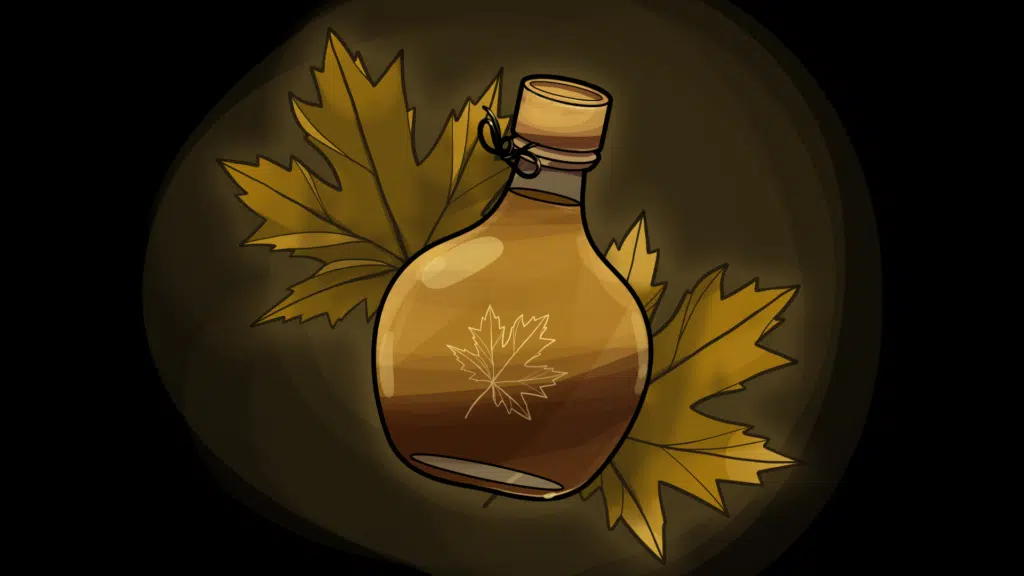By Sarah Edmonds
They are perfect. Just how he remembers them—better, even. Circular and golden, with purpled unbroken globes all over, each evenly spaced from its neighbour. Real maple syrup from all the way up north drips from lightly crisped edges. He has never had real maple syrup before, so the taste isn’t part of his memories. It’s better.
When was the first time? When he was five, he thinks, or just six. At Grandma Miriam’s. She invited them on Sundays, sometimes, after she came back from church, but the invitations didn’t begin until he was well past babyhood. Cooking may have come easy to Grandma Miriam. Forgiveness did not. It took years of visits to her house, his mother towing him behind in a bright t-shirt and jeans kept for the purpose. His mother would knock at the door and call through it that she was sorry, that Grampa Louis had given her soft words and candy and that was why she’d said yes. It had been such a relief when the hitting stopped and the soft words began that his mother had said, yes, okay, whatever. That’s what I’m made of, the boy thought when he heard this. Soft words and candy.
His mother would arrange him below the window like a show dog. Legs and arms just so, hair combed and slick and shiny. She’d make him hold up symbols of achievement: his report card, the sharing award he won in kindergarten, a drawing he’d made of him saving her from a dragon.
Grandma Miriam would ignore the door-hammering and stare down from the window, eyes and mouth nothing more than slits. Sometimes the mouth would move, silent behind the glass.
In spring or early summer, when it was cool enough that she didn’t need the air conditioner, the window would be open. He could hear the words then.
“Go away,” Grandma Miriam would say. “Go away and take this abomination with you. You don’t want your stepdaddy finding you here. You don’t want him to dig out that old strap of his.”
Then one Sunday—it was after Grampa Louis had left for good—Grandma Miriam opened the door. She stood framed there, tall and cold as a judge.
“You’d best come in,” she told his mother. His mother called him away from the window, and they went inside. His t-shirt was blue that day and very clean. No one could see the flaw at the collar that had earned it a place in the “Seconds and Returns” box. The house, too, was very clean. There was no dust, even in the sunbeams, and no noise except for the ticking of a clock somewhere down the hall.
In the yellow kitchen, Grandma Miriam sifted flour and salt and baking powder into a bowl. Added this to beaten eggs and milk and melted butter and brown sugar. She sent the boy and his mother to the bottom of her garden to pick blueberries and folded these in as well. Grandma Miriam cried a few angry tears while she fried and flipped. His mother told him later the tears were because Grampa Louis had run off with the neighbour’s daughter.
“How many jobs you working now?” Grandma Miriam asked his mother, when their piled-up plates were empty and the boy was scraping up dregs with his knife.
“Just two. Four day shifts at the diner and seven nights a week with that cleaning outfit. Macey’s one. You remember Macey? She’s doing good. Doesn’t even have to get her hands dirty anymore. We do that for her. We do offices downtown.”
“Who looks after the boy?”
“Woman in my building. She takes in two others besides. My neighbour Gretchen’s little one Margie and a boy named Connor from the floor below me. It’s good. The kids get along real well—mostly.”
“Cost a lot?”
“Not bad. Five hundred a month. Way less than that Little Angels place. And I can cover that. The diner pays 14 bucks an hour and there are tips besides. And Macey gave me a raise a few weeks ago.”
“No money troubles then?”
His mother’s chin rose. “I keep food on the table and a roof overhead, if that’s what you’re asking. Only time I’ve been late with the rent is when I got sick last fall. Landlord banged at the door threatening eviction, but when he saw me, he changed his mind.” She laughed a little, remembering. “I think cause I looked so awful.”
“Off Sundays?”
“Daytime. I’m out with Macey’s crew nights.”
Grandma Miriam went down the hall and came back with a fist full of crumpled green. “Buffer for next time. Buy the boy something. A toy or something.”
The summer he was 17 and Grandma Miriam had been dead two years, his old friend Margie had started making him pancakes too. A box mix but she used her own eggs and added milk instead of water. No blueberries—they cost too much—but still good. He loved sitting at the square kitchen table, forking up big bites and watching her at the stove. The first time she’d set a stack before him, he’d caught her hand and asked her to marry him.
She pulled away. Said, “Don’t be stupid. You don’t even have a job.” And flicked at him with the bottom of her apron. But he caught the edge of a smile before she turned back to the pan—just a small one, but there. We’ll do it one day, he told her around a mouthful, and just saying the words out loud made him believe them. She’d been part of his life as long as he could remember. Why not keep her there?
But that September, Margie went off to junior college near her aunt upstate. He couldn’t be angry. She’d talked about going to college since they were little. Seen it as the only escape from her drunk and angry mother. She wrote him every week at first, but the letters slowed and then stopped, and he understood he wouldn’t see her again. He filled his new spare hours doing deliveries part-time and hanging out with the aimless boys who gathered in the dusty parking lot of the 7-11, but nothing could fill the hole she left.
The last plateful—the one before this one—was at the diner. He’d gone to see his mother at work. The place was nearly empty, so the manager beckoned him to sit and offered him a free breakfast. His mother had worked there for more than 18 years—started before he was born. The manager might not be able to take her on full-time, but he could at least give her boy a birthday meal.
His mother served him. The skin around her eyes was pink and puffy. He knew why. She’d told him before she left for work that she’d been to Grampa Louis’s place the night before, to ask him—beg him—for some money help. Grandma Miriam’s house cost more to run than her old apartment, she’d told him. She was working all the hours God sent and yet there was never enough. She’d never asked for a cent from him before. Could he, this time, see his way to—?
Before she could finish, he’d shouldered her off the step and closed the door in her face. And she hadn’t tried the hammering and explaining, not with him. She’d just turned and walked back home, crying all the way.
They were bigger and rounder than Grandma Miriam’s and Margie’s, the pancakes his mother set in front of him that day, but not as good. A vague chemical taste. And too soft. Still, they filled his belly. He left with sweetness in his mouth and the remembered press of his mother’s lips on his hair.
He walked over to the 7-11. Jacob was there, and that Grant with the wild laugh. Grant who believed every impulse should be obeyed, who’d been in and out of trouble because of “incidents” at school (one of those incidents had involved a two-inch blade and a chubby freshman who’d refused to yield up his lunch money. The freshman had ended up with a deep gash in one arm—needed stitches and all—but because no one watching was brave enough to tell, Grant had been able to claim it was an accident).
The boy—or a man now, he supposed, a man since last Saturday—walked up to Grant and Jacob, propped his buttocks against the cinderblock wall and lit a cigarette. The three of them smoked in silence for a while.
“What’s up?” Jacob said at last. “You look kind of pissed.”
“Guess I am. More than kind of.” And he told them about his mother and Grampa Louis. Not just about his mother’s visit the night before, about all of it. About how Grampa Louis had first taken his wife’s daughter when she was not even 13, about how he had refused to drive his mother over the border for a legal termination, about how he had never helped look after the boy he had made.
Grant narrowed up his eyes and said: “Guys like that should pay.” He flicked his cigarette butt into the yellow grass and drank deep from a brown-bagged bottle. Grant was 22. He could buy liquor. Bought it for the boy and Jacob, sometimes. He wiped the neck and went to pass the bottle, but the boy waved it away.
“Pay how?” the boy asked.
“I’ll show you. Where’s he live?”
And that was how Grampa Louis ended up on the ground, a thread of blood coming from one ear. It was Grant who did the shoving, and the shouting. Grant was bigger and stronger. It was easy for him to wrest the splintered bat away from the old man and lay it upside his head. Then Grant handed the bat to the boy and told him to take over, to make sure. But the boy just stood there beside Jacob, the broken bat limp in his hand, his voice frozen in his throat. Not that it mattered. The old man was dead already.
Of course, when it came to putting the blame, Grant told everyone it all belonged to the boy, and Jacob wasn’t brave enough to say different. The police ignored the boy’s denials. They were happy with the story Grant told. It was the boy who had the motive, after all, not Grant. And both their fingerprints were on the bat. The boy’s mother cemented it by telling the court, crying all the while, that she understood why the boy had done this—that she had been tempted herself more than once.
Now it is time for this last stack of pancakes. This perfect stack.
The memory is still sweet on his tongue when the guards come for him.
Sarah Edmonds is a veteran journalist who has lived and worked in seven countries on three continents. She now lives in the United Kingdom, works as a communications consultant and is studying crime fiction writing at the University of East Anglia.

